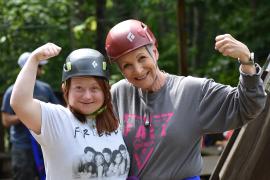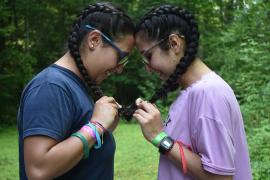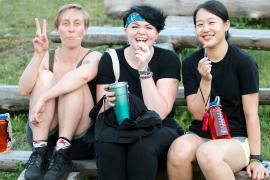Our attention is focused on us, our friends, and our social media. And we care about doing good in the world and want to make a difference. If we are honest, we simply are not sure how to do it in the complicated world we live in. This blog will expose some of our thoughts about how to find us, get us to say yes to camp, and keep us coming back.
You will also find that each of us are different (and we think special, really), so what we say won’t apply to everyone. We do hope to get the wheels turning to thinking differently and help you ask questions to your current staff to see what they would say . . . straight from the horse’s mouth.
Step One: Find Us
We live with our phones in our hands, but we listen to our friends. Find us by harnessing the word-of-mouth influence of our friends. Get camp jobs onto our phones and get us talking to our friends. Yes, we use job boards. Yes, our parents tell us about cool job options. Yes, we go to career fairs. Yes, we do random internet searches. The irony is we want authentic connection but want to approach it cautiously. We don’t want to commit to something or be hounded by an organization about which we are not sure. We really want to connect. There are so many options out there and we are not sure how to make solid decisions, so we want to keep our options open for as long as we can.
While word of mouth is the most effective recruitment method, it is also the toughest! When we hear our friends have done something they love, it really gets our attention. Help your staff make shareable content for Tik Tok, Snapchat, and whatever new platform hits our phones. Give them high quality images of them doing interesting things at camp. Get video clips of the staff in action and then post it on your media so they can share it. We like being recognized on social media, but we don’t want it to look like we are bragging. If you post it, then we can share it.
When you come to career fairs, have a fact sheet with all the details that you can give us, or have a QR code that we can scan to get everything we need in one place. Be interested in who we are in addition to telling us about your camp. Have people from our university at the booth with you as a “reference” that what you are saying is really accurate. Be sure to be on job boards of all kinds. We found no consensus about where we are looking for jobs. Some use Indeed, some use Cool Jobs, some use the Career Center on campus.
Come to our classes as guest speakers and let us do projects for your agency, that way we have the chance to get to know you. We recommend checking out the Career Bits Podcast from UNCC. Does the camp world have something like this for staff to understand more about what it is like to work at camp? We worry that there will be crying children, mosquitoes, and cardboard pizza. What is the real work of a camp counselor?
Step Two: Get Us to Say YES
When potential staff and applicants have expressed interest in your camp, it is important to connect with us and make it easy for us to connect with you. This starts with a simple application process. Make it phone friendly and easy to find on the website. We don’t want to jump through hoops to simply get an interview. Build a connection with us, and then we are willing to jump through some hoops. Get the ball rolling and make it easy to pick an interview time that does not conflict with class or work. Have an electronic way to see available times and something that will send automated reminders (like Calendly, Google calendar, Remind app, etc.). Communicate that applicants’ time is of value to you and you want to connect. Ask our preferred communication method. Once we say yes to the job, then create an online community where we can get to know people (GroupMe, Discord, Slack, etc.).
When we have a range of job choices, we often really examine what type of support we will get and what training opportunities will help us be able to do a great job. Several factors are important:
- The connection we feel with the supervisor matters (Do they care about me? Will they tell me the truth and help me get better? Will they let me know when I do something right or only when I do something wrong?)
- We want to get better and want important lines for our resume (What skills transfer to other jobs? What training/certifications will the camp pay for to help me help them? How will what I learn apply to other aspects of my life and future job prospects?)
- What specific training will help me with behavior management? Most of us have not had to confront people and help them when they have messed up, so we are less confident about this area.
We found that many students want to have a personal connection with their supervisor, to know that they care about them as an individual and are invested in their personal and professional development beyond the summer months. Staff are looking for continued support throughout the season. Some of this support can look like investing in training. Many seasonal staff may not have much experience and want to feel adequately prepared for what is to come. Ample training in combination with continued support will help staff feel valued and will keep them committed and wanting to return. Promising practices for behavior management and skills that can be applied elsewhere rose to the top of the training list. It is helpful to include guidelines or expectations and act out scenarios so staff know what to do when the time arises.
Lastly, remember that pay is not of the highest concern to all staff. Some are more invested in the experiences they can get while working at camp instead of the pay. However, a better salary certainly helps pay the bills! Most of us have rent over the summer plus a myriad of monthly bills that don’t stop because we are at camp.
The two biggest hurdles that get in the way of committing to work at camp are the expectation to work the whole summer and the fear that we do not have adequate skills to do the job well. Building in peer-to-peer communication can go a long way in helping us feel confident. Feed us bite-sized bits of information before we get to camp while we are curious about what we can expect. It helps calm the nerves and gives us more understanding of what it will be like at camp when we actually get there. Even better if we can feel like we are making friends before we arrive.
Step Three: Keep Us Coming Back
It is easier to work with someone who has been through training, buys into the mission, and wants to be at camp than starting cold with a new recruit. So, now that you have us working at camp, how can you keep us around for the upcoming seasons? We determined that the essential things that build retention among staffers are supportive supervisors, organized spaces, and a chance for them to move up in leadership roles.
Building a relationship with your staff is one way to help them feel more supported in the workplace. Without positive interactions between supervisors and staff, staff can feel distant and not a part of something bigger. A way to incite these deeper relationships is by facilitating staff bonding activities outside camp time. Activities as a group (like ax throwing, game nights, and trampoline parks) allow everyone to be casual and learn new things about each other while still being professional.
Aside from building supportive relationships, having an intentional camp system and process is vital. Questioning what is happening next or what the plan is, tends to make staff feel uneasy (and the campers will also pick up on that!). The feeling of comfort and being knowledgeable will have staff come back season after season.
Lastly, learning transferable skills and ways to move up in the organization will have staff returning after each season. Leadership, critical thinking, and time management skills are all things that staff can take from their summers at camp and use in other industries later in life. These are also skills that they can showcase to supervisors to have upward mobility within camp. Opportunities to be promoted to leadership roles will increase retention each camp season.
Final Thought
The most important piece of advice we can offer you is to ask questions about these three steps to YOUR current staff! Find out what makes them tick, what ticks them off, and what makes them stick with you. The staff will feel more valued by you when you ask them detailed questions and get them involved in the staff recruiting process. Invest in us as a whole person and we will go the extra mile to make a difference. You will be showing us the way by your leadership.
Sylvia Blanton is a senior with dreams of working in the academic side of collegiate sports; Isabella Delong is a senior with aspirations of working in camp ministry; Brauer Dowd is a senior with ambitions of working within camp and youth ministry; Seth Richardson is a sophomore with goals of working as a park ranger or with the forest service. All are Parks, Recreation and Tourism Management majors at Clemson University. Thoughts or questions can be sent to Dr. Gwynn Powell at [email protected].
The views and opinions expressed by contributors are their own and do not necessarily reflect the views of the American Camp Association or ACA employees.




